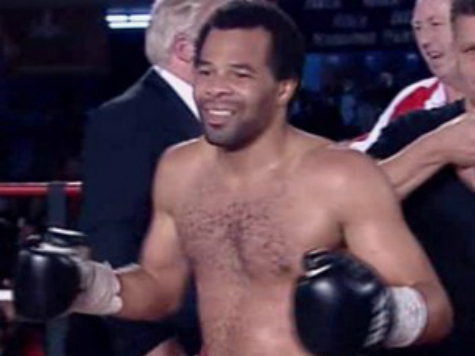Unemployed, facing a new mouth to feed, and burdened with two house payments, I made the perfectly defensible decision, at least in the eyes of boxing die-hards, to spend $50 to order the Roy Jones-Joe Calzaghe pay-per view six years ago.
Only I could not have cared less to watch the over-the-hill American play punching bag to the patty-cake fists of the undefeated Welshman. Perhaps for the first time in the history of pay-per-view buys, someone ordered a fight to watch not just a match deep on the undercard, but the combatant in that bout placed there at the last minute in the hopes that he would give a prospect quality rounds before dutifully losing. Emanuel Augustus upstaged hometown hero Francisco Figueroa in Madison Square Garden that night in everyone’s eyes but two judges. It would not be the last time he received a raw deal.
The man Floyd Mayweather calls the toughest fight of his career faces the fight of his life.
Emanuel Augustus, a staple of ESPN’s Friday Night Fights cards in the first decade of the new millennium and one of the most colorful athletes in the history of a colorful sport, was shot Monday night in Baton Rouge, Louisiana. Characteristically, Augustus walked near a boxing gym at the time of the assault. Unsurprisingly, his assailant shot him in the back of the head in the manner of a coward. The master showman remains on life support.
Emanuel Augustus made the sweet science an art. The human roller coaster edged off the tracks often only to find his way back on the rails. This exhilarating feeling left the riders rushing through the turnstiles for another go-round.
Most fighters rely on a jab as the default weapon. Augustus preferred the bolo punch. He remains the only boxer I have ever seen throw, let alone land, a double punch. Other fighters keep their guard glued to their cheeks. Augustus, in a sense, did, too. The pugilist planted his gloves behind his back for long, uncomfortable stretches. This showboating always seemed primed to end badly for Augustus but instead inevitably ended in embarrassment for frustrated foes.
Larry Holmes may have boasted boxing’s best jab. Mike Tyson could throw an uppercut. Nobody could showboat like Emanuel Augustus.
The signature style wasn’t chin-forward-arms-back or the bolo but a bizarre in-ring ritual that abruptly turned a blood-and-sweat slugfest into a surreal spectacle of unchoreographed dancing. For the uninitiated, stumbling upon Augustus on ESPN inevitably served as a jaw-dropping, what-in-the-world-just-happened moment. Appearing as a puppet without strings, Augustus made looping, exaggerated movements with his arms and legs that encouraged opponents to tee off at a mocking face that quickly became air. The fluid dancing often shifted into herky-jerky, robotic maneuvers that proved hypnotic to opponents and onlookers. He admitted modeling his movements on a character from the video game Tekken. The truth of this appeared so obvious that fans spontaneously referred to him as “The Drunken Master.”
His uncanny style, exhibited whenever the moment called for it, screamed “Drunken Master.” But his ever-changing look disguised his appearance, especially when glimpsing him on ESPN from a distance. The question, “Who’s this guy fighting like Emanuel Augustus?,” found an answer of “Emanuel Augustus” after much pixel-close inspection. Nobody fought like Emanuel Augustus. But nobody, not even Emanuel Augustus, looked like him. He boxed in a bushy Bake McBride afro, R. Kelly cornrows, Bob Marley dreads, Johnny Mathis matted-down mane, and Kojak cue-ball. He wore a Grizzly Adams beard here, a Ron Jeremy stash there. He never metamorphosized mid-match into a Chinese woman. But the possibility could never be truly discounted.
Further confusing matters, the stringless puppet showed up on ESPN one night with a new name. Emanuel Burton, the kid partially raised in foster care who never knew his biological father, adopted the Augustus surname after his stepfather married his mother in homage to the man’s influence on his life. The “Emanuel Burton” never once separated from a clinch in his entertaining 2000 fight with Floyd Mayweather partnered with Micky Ward the following year as “Emanuel Augustus” to deliver Ring magazine’s “Fight of the Year.”
Augustus owns signature wins over Ray Oliveira, Courtney Burton, and Carlos Wilfredo. Known for taking fights on short notice, calling home any weight class that called for him, and journeying to Russia, Australia, Denmark, and all points between for a pay day, Augustus often played the role of “opponent.” Expected to lose, the unorthodox pugilist frequently rebelled against the assigned role and acted as the spoiler. Unfortunately, judges often scored the fight they expected to see rather than the fight in front of them. This made Augustus the best 34-loss fighter in the history of boxing.
“Absolutely,” today’s best zero-loss boxer responded to a query whether he still considered The Drunken Master his most difficult opponent. “Emanuel Augustus was my toughest opponent thus far. His record didn’t show his skill set. But the guy was unbelievable.”
His end, considering the similar sad fates of Arturo Gatti, Vernon Forrest, and Hector Camacho, proves all too believable.

COMMENTS
Please let us know if you're having issues with commenting.